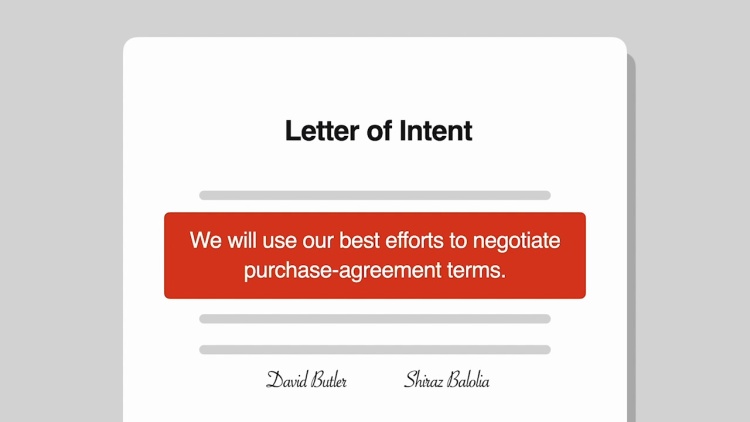Butler v. Balolia
United States Court of Appeals for the First Circuit
736 F.3d 609 (2013)

- Written by Eric Cervone, LLM
Facts
David Butler (plaintiff) was an inventor who created a new technology. Shiraz Balolia (defendant) sought to purchase the technology from Butler. After some negotiations, the two parties ultimately signed a letter of intent. The letter stated the parties’ intention to negotiate and enter into a separate purchase agreement on a specific date. The letter included a purchase price, which was to be paid upon closing. The letter stipulated that the parties would use their best efforts to negotiate and attempt to agree to terms for the purchase agreement. The letter also included covenants of confidentially and exclusivity. Butler was also prohibited from negotiating with any other prospective purchaser before the signing deadline. Butler stated that he in fact declined inquiries from other potential buyers. The transaction did not take place, and no purchase agreement was ever signed. According to Butler, Balolia falsely claimed to have found deficiencies in the technology. Balolia used those claims as a basis for attempting to rescind the letter of intent and renegotiate the agreement. Butler then brought suit in state court. Butler sought a declaration that the letter of intent was an enforceable contract. Balolia removed the case to federal court based on diversity jurisdiction. Balolia then filed a motion to dismiss. The trial court granted the motion to dismiss, holding that the letter of intent was not an enforceable contract. Butler appealed.
Rule of Law
Issue
Holding and Reasoning (Selya, J.)
What to do next…
Here's why 905,000 law students have relied on our case briefs:
- Written by law professors and practitioners, not other law students. 47,100 briefs, keyed to 995 casebooks. Top-notch customer support.
- The right amount of information, includes the facts, issues, rule of law, holding and reasoning, and any concurrences and dissents.
- Access in your classes, works on your mobile and tablet. Massive library of related video lessons and high quality multiple-choice questions.
- Easy to use, uniform format for every case brief. Written in plain English, not in legalese. Our briefs summarize and simplify; they don’t just repeat the court’s language.





